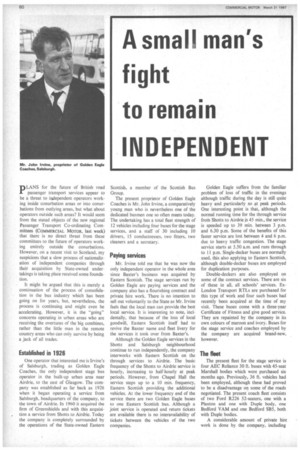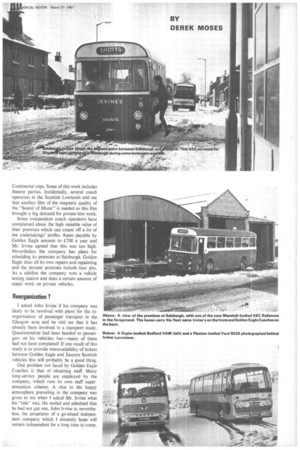A sma man's fight to remain INDEPENDENT
Page 62

Page 63

If you've noticed an error in this article please click here to report it so we can fix it.
pLANS for the future of British road passenger transport services appear to be a threat to independent operators working inside conurbation areas or into conurbations from outlying areas, but what about operators outside such areas? It would seem from the stated objects of the new regional Passenger Transport Co-ordinating Committees (COMMERCIAL MOTOR, last week) that there is no direct threat from these committees to the future of operators working entirely outside the conurbations. However, on a recent visit to Scotland, my suspicions that a slow process of nationalization of independent companies through their acquisition by State-owned undertakings is taking place received some foundation.
It might be argued that this is merely a continuation of the process of consolidation in the bus industry which has been going on for years, but, nevertheless, the process is continuing and might even be accelerating. However, it is the "going" concerns operating in urban areas who are receiving the overtures of the big combines, rather than the little man in the remote country areas who can only survive by being a jack of all trades.
Established in 1926
One operator that interested me is Irvine's of Salsburgh, trading as Golden Eagle Coaches, the only independent stage bus operator in the built-up urban area near Airdrie, to the east of Glasgow. The company was established as far back as 1926 when it began operating a service from Salsburgh, headquarters of the company, to the town of Airdrie. In 1960 it acquired the firm of Greenshields and with this acquisition a service from Shotts to Airdrie. Today the company is completely surrounded by the operations of the State-owned Eastern Scottish, a member of the Scottish Bus Group.
The present proprietor of Golden Eagle Coaches is Mr. John Irvine, a comparatively young man who is nevertheless one of the dedicated busmen one so often meets today. The undertaking has a total fleet strength of 12 vehicles including four buses for the stage services, and a staff of 30 including 10 drivers, 15 conductresses, two fitters, two cleaners and a secretary.
Paying services
Mr. Irvine told me that he was now the only independent operator in the whole area since Baxter's business was acquired by Eastern Scottish. The stage services run by Golden Eagle are paying services and the company also has a flourishing contract and private hire work. There is no intention to sell out voluntarily to-the State as Mr. Irvine feels that the local man can provide the best local service. It is interesting to note, incidentally, that because of the loss of local goodwill, Eastern Scottish itself had to revive the Baxter name and fleet livery for the services it took over from Baxter's.
Although the Golden Eagle services in the Shotts and Salsburgh neighbourhood continue to run independently, the company interworks with Eastern Scottish on the through services to Airdrie. The basic frequency of the Shotts to Airdrie service is hourly, increasing to half-hourly at peak periods. However, from Chapel Hall the service steps up to a 10 min. frequency, Eastern Scottish providing the additional vehicles. At the lower frequency end of the service there are two Golden Eagle buses to one Eastern Scottish bus. Although a joint service is operated and return tickets are available there is no interavailability of tickets between the vehicles of the two companies. Golden Eagle suffers from the familiar problem of loss of traffic in the evenings although traffic during the day is still quite heavy and particularly so at peak periods. One interesting point is that, although the normal running time for the through service from Shotts to Airdrie js 45 min., the service is speeded up to 39 mm. between 3 p.m. and 6.30 p.m. Some of the benefits of this faster service are lost between 4 and 6 p.m. due to heavy traffic congestion. The stage service starts at 5.50 a.m. and runs through to 11 p.m. Single-decker buses are normally used, this also applying to Eastern Scottish, although double-decker buses are employed for duplication purposes.
Double-deckers are also employed on some of the contract services. There are six of these in all, all schools' services. ExLondon Transport RTLs are purchased for this type of work and four such buses had recently been acquired at the time of my visit. These buses come with a three-year Certificate of Fitness and give good service. They are repainted by the company in its own colours of maroon and ivory. Buses for the stage service and coaches employed by the company are acquired brand-new, however.
The fleet
The present fleet for the stage service is four AEC Reliance 30 ft. buses with 45-seat Marshall bodies which were purchased six months ago. Previously, 36 ft. vehicles had been employed, although these had proved to be a disadvantage on some of the roads negotiated. The present coach fleet consists of two Ford R226 52-seaters, one with a Plaxton and one with Duple body, one Bedford VAM and one Bedford SB5, both with Duple bodies.
A considerable amount of private hire work is done by the company, including Continental trips. Some of this work includes theatre parties. Incidentally, several coach operators in the Scottish Lowlands told me that another film of the magnetic quality of the "Sound of Music" is needed as this fihn brought a big demand for private hire work.
Some independent coach operators have complained about the high rateable value of their premises which can cream off a lot of the undertakings' profits. Rates payable by Golden Eagle amount to OM a year and Mr. Irvine agreed that this was too high. Nevertheless the company has plans for rebuilding its premises at Salsburgh. Golden Eagle does all its own repairs and repainting and the present premises include four pits. As a sideline the company runs a vehicle testing station and does a certain amount of repair work on private vehicles.
Reorganization ?
I asked John Irvine if his company was likely to be involved with plans for the reorganization of passenger transport in the Glasgow area and he told me that it has already been involved in a transport study. Questionnaires had been handed to passengers on his vehicles; but—many of these had not been completed! If one result of this study is to provide interavailability of tickets between Golden Eagle and Eastern Scottish vehicles this will probably be a good thing.
One problem not faced by Golden Eagle Coaches is that of obtaining staff. Many long-service people are employed by the company, which runs its own staff superannuation scheme. A clue to the happy atmosphere prevailing in the company was given to me when I asked Mr. Irvine what his "title" was. He smiled and admitted that he had not got one. John Irvine is, nevertheless, the proprietor of a go-ahead independent company which I sincerely hope will remain independent for a long time to come.
















































































































